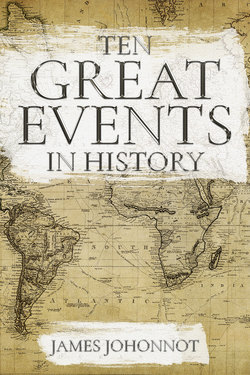Читать книгу Ten Great Events in History - James Johonnot - Страница 12
На сайте Литреса книга снята с продажи.
THE NINTH CRUSADE.
Оглавление70. Some eight years later the tidings that Antioch had been taken by the infidels revived in St. Louis the old yearning for the rescue of the holy places. Cheered by the sympathy of Pope Clement IV, he embarked with an army of sixty thousand in 1270, but a storm drove his ships to Sardinia, and thence they sailed for Tunis. They encamped on the site of Carthage, when a plague broke out. The saintly king was among the victims, and the truest of all crusaders died. In the following year Edward, of England, reached Acre, took Nazareth—the inhabitants of which he massacred—fell sick, and during his sickness narrowly escaped being murdered by an assassin sent by the Emir of Joppa. Having made a peace for nine years, he returned to Europe, and the ninth and last crusade was at an end.
71. The after fate of the Holy Land may be briefly told: The Christians, unmindful of their past sufferings and of the jealous neighbors they had to deal with, first broke the truce by plundering some Egyptian traders, near Margat. The Sultan revenged the outrage by taking possession of Margat, and war once more raged between the two nations. Tripoli and the other cities were captured in succession, until at last Acre was the only city of Palestine remaining to the Christians.
72. The Grand Master of the Templars collected his small and devoted band, and prepared to defend to the death the last possession of the order. Europe was deaf to his cry, the numbers of the foe were overwhelming, and devoted bravery was of no avail. In the disastrous siege the Christians were all but exterminated. The Grand Master fell at the head of his knights, pierced by many wounds. Seven Templars and as many Hospitallers alone escaped from the dreadful carnage. The victorious Moslems then set fire to the city, and the rule of the Christians in Palestine was brought to a close forever.
43
73. Kingsley ably summarizes the effects of the crusades as follow: "Egypt was still the center of communication between the two great stations of the Moslem power; and, indeed, as Mr. Lane has shown us in his most valuable translation of the 'Arabian Nights,' possessed a peculiar life and character of its own.
74. "It was the rash object of the crusaders to extinguish that life. Palestine was first their point of attack, but the later crusaders seem to have found, like all the rest of the world, that the destinies of Palestine could not be separated from those of Egypt, and to Damietta accordingly was directed that last disastrous attempt of St. Louis. The crusaders failed utterly of the object at which they aimed. They succeeded in an object of which they never dreamed; for in those crusades the Moslem and the Christian had met face to face, and found that both were men, that they had a common humanity, a common eternal standard of nobility and virtue. So the Christian knights went home humbler and wiser men, when they found in the Saracen enemies the same generosity, truth, mercy, chivalrous self-sacrifice, which they fancied their own peculiar possession; and, added to that, a civilization and a learning which they could only admire and imitate. And, thus, from the era of the crusades, a kindlier feeling sprang up between the Crescent and the Cross, till it was again broken by the fearful invasions of the Turks through Eastern Europe.
75. "The learning of the Moslem, as well as their commerce, began to pour rapidly into Christendom, both from Spain, Egypt, and Syria; and thus the crusaders were, indeed, rewarded according to their deeds. They took the sword and perished by the sword. But the truly noble element in them, the element which our hearts and reasons recognize and love, in spite of all the folly and fanaticism of the crusades, whensoever we read 'Ivanhoe' or the 'Talisman,' the element of loyal faith and self-sacrifice, did not go unrequited.
44
76. "They learned wider, juster views of man and virtue, which I can not help believing must have had great effect in weakening in their minds the old, exclusive, bigoted notions, and in paving the way for the great outburst of free thought and the great assertion of the dignity of humanity which the fifteenth century beheld. They opened a path for that influx of scientific knowledge which has produced in after centuries the most enormous effects on the welfare of Europe, and made life possible for millions who would otherwise have been pent within the narrow bounds of Europe to devour each other in the struggle for life and bread!"
